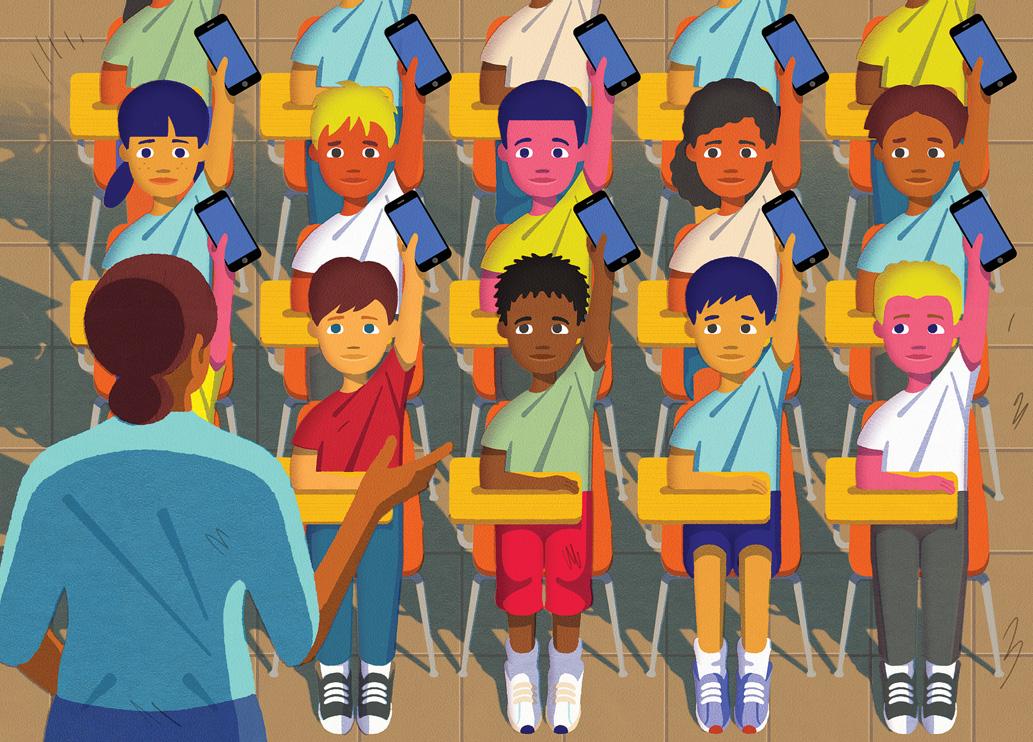Teach kids about misinformation

THE CANADIAN WILDFIRES were caused by space lasers? The U.S. government is run by lizard people? The COVID vaccines contain microchips? Nope, nope and nope. That all may seem obvious, but a surprising percentage of people believe such nonsense: an Abacus survey from June of 2022, for example, found that a quarter of Canadians think that it is possibly (14 per cent) or probably true (11 per cent) that COVID vaccines include secret chips designed to monitor and control their behaviour. Put another way, 3.3 million Canadians were pretty sure there were microchips in the vaccines and another 4.2 million were open to the idea. (To be clear: no microchips.) It's easy to mock these kinds of offthe-rails beliefs, but we shouldn't. In my work as a professor and author, I've been researching public representations of science for decades-including how misinformation and pseudoscience are disseminated online and I still need to remind myself to dial back the snark. People believe, share and act on harmful misinformation for complex reasons: maybe they're under financial stress, or they're experiencing mental health challenges, or they distrust government.
But, these days, there's also the problem of volume. Humans are bombarded with about 74 gigabytes of information every day, which is roughly equivalent to watching 16 movies. We check our phones more than 100 times a day. Plus, the incentives baked into our attention economy-likes, follows and retweets-are all rigged to encourage the sharing of questionable content. This ridiculously chaotic information environment could cause any adult to fall for things they shouldn't.
Esta historia es de la edición September 2023 de Maclean's.
Comience su prueba gratuita de Magzter GOLD de 7 días para acceder a miles de historias premium seleccionadas y a más de 9,500 revistas y periódicos.
Ya eres suscriptor ? Conectar
Esta historia es de la edición September 2023 de Maclean's.
Comience su prueba gratuita de Magzter GOLD de 7 días para acceder a miles de historias premium seleccionadas y a más de 9,500 revistas y periódicos.
Ya eres suscriptor? Conectar

A DIVIDED CITY
In Windsor, Ontario, lives, careers and family ties have transcended the Canada-U.S. border for generations. Today, Trump's trade war is an existential threat for Canada's most American city.

SALT AND CEDAR
A couple build a minimalist retreat in sync with the Atlantic's stormy coastlines

My Weekend at Sad Camp
After my mother’s death, I signed up for a grief retreat in the forests of California. It upended everything I knew about mourning—and healing.

Never For Sale
This country has spent 250 years fighting American aggression. How resistance and resilience became the heart of Canada's national identity.

FACES OF THE TRADE WAR
Donald Trump's trade war is an existential threat for Canada's small and medium-sized businesses. Every year, they export more than $200 billion worth of goods to the United States and import nearly $150 billion worth—including equipment, food, construction materials and other products they need to stay afloat. Now, as businesses contend with tariff-induced inflation, suppliers are disappearing, prices are skyrocketing and profit margins are shrinking or vanishing altogether. That puts small-business owners on the frontlines of the trade war. Here, five of them describe their hopes, fears and game plans as they navigate U.S. tariffs, Canadian countermeasures and an economic climate of unprecedented uncertainty.

MY ADVENTURES WITH CANADIAN BOOKS
I left Russia as the country slid into authoritarianism and arrived in Canada knowing no one. In its novels, I found a blueprint for how to survive as a nation in the age of anger.

HOW TO FIGHT BACK
Trump's tariff war was a wake-up call for Canada to abandon its gentle complacency and take some big swings. Here are eight gutsy, radical ideas to secure the nation's future.

Harvest Water From Fog
Canada’s fresh-water supply has been drained by drought and dwindling aquifers. To find more, just look up.

Diana Matheson, Olympic soccer star and Northern Super League founder, is giving Canadian women a pro league of their own
BACK WHEN DIANA MATHESON was a star midfielder for Canada’s national women’s soccer team, plays were analyzed using magnets on tactical boards.

“I fled war zones in two countries. Now I build homes in Alberta.”
I left Ukraine behind, then Israel. In Calgary, I started over cleaning construction sites.
